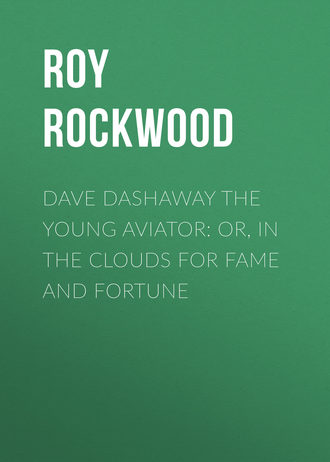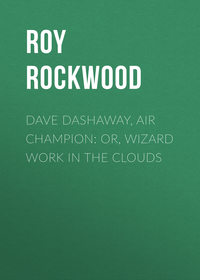 полная версия
полная версияDave Dashaway the Young Aviator: or, In the Clouds for Fame and Fortune
“Why don’t you have him arrested?”
“If there had been a policeman in sight I would have done that, on my first impulse,” declared Dave. “There wasn’t and I’ve had time to think.”
“What are you going to do?”
“Follow him to Genoa, find out where he stays, and make sure of getting him before he knows that I am on his track and becomes alarmed.”
“That’s so. What you’re thinking of, too, I suppose, is Mr. King’s property?”
“That’s it. Of course this boy thief has disposed of it, but if I get him cornered right he may be glad to tell where it is.”
Dave relapsed into thought, laying out his plans as to the boy in the auto ahead. Hiram had never been in an automobile before. He gave himself up to the enjoyment of the invigorating breeze and the rapid spin.
“Say,” he broke out finally, as a new thought struck him, “that boy you’re after looked pretty finely dressed up, didn’t he?”
“It seems so,” responded Dave.
“And hiring an automobile, too. He must have lots of money.”
“Stolen, probably,” said Dave.
The chauffeur seemed to thoroughly understand his business. He kept the blue car always in view, but progressed so as not to awaken any suspicion that he was following it.
Genoa was about twenty miles distant. The blue car did not proceed very fast. It stopped at a little town on the way. Its passenger smoked a great many cigarettes, and seemed enjoying an easy, luxurious ride.
Dave’s car kept near to the blue auto as they reached the outskirts of Genoa. Finally the blue car halted in front of a hotel. Its passenger leaped to the curb, took out a roll of banknotes, and ostentatiously paid the chauffeur.
“Stop right here,” Dave ordered. “I’ll be back soon.”
He got to the sidewalk, and was directly in front of the hotel as the boy he was following strutted through its entrance with an important air. As he came under the full glare of the electric light, Dave caught sight of the tell-tale scar on his cheek.
The fellow did not much resemble the lodging house boy. His hair was neatly cared for, his clothes were of the most expensive kind. For all the world, he suggested a person with plenty of money to spend and wealthy relations.
The boy went up to the desk of the hotel clerk, who bowed and smiled to him as though he was some favored and welcome guest. The clerk handed him a key, and the boy went over to the elevator and stepped in. Dave quickly hastened to the desk.
“Excuse me,” he said, “but I wish to see the young man who just got his key.”
“Yes, room 47. Take the elevator,” vouchsafed the clerk.
“Thank you.”
Dave waited till the elevator had come down. Then he went up to the fourth floor. He went down a corridor, scanning the little porcelain numbers on the doors.
“Here it is,” he said eagerly to himself – “No. 47.”
A light showed through its transom. Tap – tap – tap! Dave knocked smartly on the door panel. Some one, whistling and bustling about within the room, moved to the door, unlocked it, and Dave stood face to face with the boy who had robbed him in the lodging house at Brompton.
CHAPTER XXIII
A GREAT SURPRISE
Dave looked the boy he had followed and run to cover squarely in the eye. There could be no mistake as to his identity. The scar on his face showed plainly. For all of his gay clothes and jaunty appearance, the fellow had the same repellant features that Dave had noticed at the lodging house the night he was robbed.
For a minute the fellow looked surprised. Then his memory quickened to recognition. He turned pale, his lips trembled, and he blurted out unsteadily:
“W – what do you want?”
“I want you,” said Dave simply and sternly.
Quick as a flash the boy thief realized his situation, it seemed. He made a move for which Dave was unprepared. Making a light spring, one hand extended, he swept Dave clear of the threshold of the room, and sent him crashing back against the other wall of the corridor.
Before Dave could recover himself the door was violently slammed shut. Dave heard the key turn in the lock. Then there were hurried movements about the room.
Dave was mad at being outwitted. He was determined, too. He threw himself against the door, but could not budge it.
“Open this door!” he shouted, pounding upon the panels. “It will be the better for you.”
No attention was paid to this. Dave continued to hammer on the door.
“You’re a thief!” he cried. “I’ll rouse the whole hotel and leave you publicly disgraced if you don’t come out. I want back the property you stole from me, and I’m bound to have it.”
Dave made a spring. His foot landed on the outside door knob. He caught at the tilted transom to steady himself. Just then a figure came hurrying down the corridor. Dave’s foot was seized and he was dragged to the floor.
“Here, what you up to, with all this noise?” demanded his captor, a hall man of the hotel, by his uniform.
“There’s a thief in that room,” cried Dave breathlessly.
“A thief?”
“Yes.”
“How do you know?”
“He robbed me. He just slammed the door in my face. Have you a key to that room?”
“Why, yes, but – ”
“Unlock the door, then. I’ll face him down for you. You can take both of us to the hotel clerk, and I’ll speak the truth.”
The hall man hesitated a trifle, but Dave’s earnest urging induced him to produce a bunch of keys. Dave rushed into the room. He looked all around it.
“Why,” he cried, “it’s empty! The fellow is gone!”
Dave peered into a closet, under a bed, and then ran to the window. There the hall man was looking at a coat and hat lying on the platform of the fire escape, just outside of the casement.
“This is a queer go,” he said, slowly and dubiously, “but there seems to be something to your story.”
“I should think there was, a whole lot,” declared Dave. “Don’t you see?”
“What?”
“The fellow has escaped. He knew I was bound to get into this room. Those things fell out of his satchel as he got through the window.”
“Yes, his satchel is gone, that’s so,” observed the hall man. “Say, you had better report this to the clerk.”
Dave was very much disturbed and disappointed. There could be no doubt that the boy thief had escaped by the window route. It would probably be in vain to try to follow him now. Dave dashed out into the corridor and ran down the stairs, not waiting for the elevator.
The clerk was talking to a guest, polite and imperturbable. He simply inclined his head as Dave burst forth:
“The boy in 47.”
“Ah, yes!” answered the hotel clerk.
“Who is he?”
The clerk turned the big register around, flipped back a page or two, and set his finger on a name.
Dave read it, and nearly fell down where he stood. He had never been so startled and dumbfounded in his life. The name on the register, written in a big, sprawling hand was —
“Dave Dashaway!”
Dave grasped the marble counter slab for support with both hands. He gasped and started.
“My name!” he exclaimed. “Why, what does this mean?”
“What’s the trouble?” inquired the guest, who had been conversing with the clerk. He could not help but notice Dave’s perturbation.
“Why,” cried Dave, “I followed a fellow here, to room 47. He is a thief. He robbed me of valuable property two weeks ago. He just slammed the door of his room in my face.”
“A thief?” spoke the clerk, arching his eyebrows. “Are you pretty sure?”
“I should think so,” retorted Dave, “seeing that, rather than meet me, he has made off by the fire escape, baggage and all.”
The hotel clerk blinked in his usual calm way, but touched a bell to summon the hall man from the fourth floor.
“And he stole my name,” cried Dave. “Why?”
“Is that your name?” inquired the clerk, pointing to the register.
“It is,” assented Dave.
“Strange. Let me see, forty-seven – Dashaway,” and the clerk went to a case covered with little cards and selected one. “Oh, yes, has been here twice in a week. Prompt pay. Old gentlemen with him here once, grandfather, I believe. Very respectable old man.”
“See here,” said Dave realizing that he was wasting time, “I don’t want to make you any trouble, but I must report this to the police.”
“The only thing to do, I should say,” replied the clerk.
“Where is the nearest police station?”
“Two squares down, one square south.”
“Thank you,” said Dave, and darted away.
He hurried out of the hotel and up to the automobile he had recently left.
“Wait here,” he directed Hiram.
“Is it the boy you supposed?” asked Hiram.
“Yes. I can’t explain now. I’ll be back in five minutes.”
Dave was not afraid to face the police on this occasion. He could now use the name of Mr. King. He planned to have the police get promptly on the trail of the boy thief.
Dave located the police station and ran up its steps. At a desk in a large room sat the office clerk, writing.
“I want to report a case of robbery,” said Dave.
“All right, see the lieutenant,” responded the clerk.
“Where is he?”
“That’s his room yonder,” was the reply, and the man pointed to a small room leading off from the main apartment. “He’s off with a squad, but he’ll be back soon.”
Dave moved over to the open doorway indicated. He was greatly excited over all the incidents of the past two hours, and hardly had the patience to wait for the lieutenant.
He decided to go into the room, however, and wait for the official’s return. The minute he stepped across the threshold, however, he was aware that the room held two occupants.
Then Dave Dashaway discovered something else, that was the surprise of his life. First one, and then the other of the two occupants of the room arose in a hurry.
“Why, what luck – the very boy!” sounded one voice.
“Dave Dashaway!” cried the other.
And the boy aviator came to a standstill with a shock, as he recognized his old guardian, Silas Warner, and the sheriff from Brookville.
CHAPTER XXIV
SOMETHING WRONG
Dave was a good deal disheartened. It was several hours after his meeting with the two persons he wished most to avoid. And now Dave was a prisoner.
He sat crowded up on the back seat of a rickety old wagon, covered with canvas top and sides, and boarded up at the back. Beside him was his foxy-eyed, ferret-faced guardian, old Silas Warner. On the front seat, acting as driver, was the Brookville sheriff. Around Dave’s wrist was what is called a “come-along,” or rope handcuff, its two crossed stay pieces of wood being held tightly by the watchful, sleepless Warner.
The way this had all come about seemed like a dream to Dave. The instant that his guardian and the sheriff had recognized the runaway they were seeking, they had pounced down upon poor Dave like hungry wolves.
Silas Warner held our hero while the sheriff hurried out into the main room of the station. He spoke a few words to the police clerk, and then Dave was led out of the place, both men holding tightly to him, and soon found himself in a room in a cheap boarding house.
Dave had tried to expostulate, to explain. His jubilant captors had refused to listen to him. He had frantically begged of them to allow him to send word to some friends, to take a simple message to the police lieutenant.
“Don’t trust him for a minute, Daniel Jackson,” his guardian shouted to the sheriff. “You know what a slippery one he is.”
“But it’s important,” pleaded Dave. “A fellow robbed me. He must be caught.”
“All a pack of lies,” declared old Warner. “Don’t trust him or listen to him, Sheriff. He’s trying to get his friends to rescue him, trying to put on time to delay us, and slip.”
“Oh, indeed, no,” answered Dave desperately.
“Shut up. Sheriff, we’ll make our plans, and bundle this boy back to Brookville quick as we can get him there.”
Over Dave the sheriff kept close watch and ward while Warner went away to make arrangements of which Dave learned later. It was long after midnight when these plans were perfected. By that time, from the conversation of the two men, Dave found out a great deal that was new to him, and astonished him not a little.
It seemed that by the sheerest accident the two men had come across Dave at a time when they were on their way to Dayton to arrest him. They were on their way to that city, because Jerry Dawson had written Warner that there he would find his runaway ward.
This was the reason why Jerry had boasted to Dave that he would not make any more air flights. His crony, Brooks, had overheard Dave tell Hiram all about his guardian and the circumstances of his leaving home, and the mean-spirited Jerry had been quick to take advantage of the chance to get his rival into trouble.
It seemed that Warner, with his usual miserly penuriousness had hired the sheriff to “work cheap.” They had got as far as Genoa through “lifts” in various farm wagons. They had taken the cheapest lodgings that evening they could find. The sheriff and Warner happened to be at the police station, because the former had a slight acquaintance with the lieutenant, and was waiting to see him when Dave arrived.
Silas Warner had managed to hire a sorry nag and a miserable wreck of an old milk wagon to convey them back to Brookville. Dave’s feelings may be imagined when he found himself in the clutches of the enemy. He had been in torment to think that Hiram and the chauffeur would wait for him vainly. He wondered what Mr. King would think of this second unusual absence. Most of all, poor Dave nearly wept when a thought of the great air race of the morrow came into his mind. He would miss the grand event in which he had hoped to take so proud a part.
“It’s awful, just awful,” reflected Dave, feeling well-nigh crushed, “and no hope of my getting any word of explanation to my friends.”
It must have been two o’clock in the morning when the wagon come to a halt. Dave had caught sight of lights ahead on the road as they jogged along. Then strains of music grew plainer. The shouts of merry makers filled the air.
It appeared that they had reached a roadhouse with a dancing pavilion and park attached to it, much in favor with excursion parties from the country around. Outside of the place stood a hayrack with four horses attached.
“Horse needs a rest, Warner,” the sheriff declared, “and some refreshment wouldn’t hurt you and me, hey?”
“Nothing for me, Sheriff, nothing for me,” the miserly old fellow was quick to retort. “Of course you can buy what you want – with your own money.”
“Just so. Well, I’ll stretch my limbs a little and sort of see what that jolly crowd is up to.”
The old man kept his tight hold on Dave. He would silence the youth every time the latter tried to talk or reason with him or question him. With low mutterings and chuckles he hinted that the law would see to it that Dave did not again “desert his comfortable home.”
It was fully four o’clock when the sheriff came back to the wagon. He pulled himself up into the seat like an overfed porpoise.
“Just going to break up, that crowd,” he observed, “and having a great time. I wish I was young again. Get up, there,” he added to the horse.
Dave made up his mind that he would be given no chance to escape, at least during the trip to Brookville.
There came a rumbling behind them as the horse was plodding along a narrow country road with a deep ditch on either side of it. Then singing voices broke the silence. The party from the roadhouse was homeward bound.
The road twisted and turned. At its narrowest part, before the sleepy-headed driver could realize it, the great loaded hayrack wagon lumbered by. Its side grazed the inside wheels of the wagon the sheriff was driving.
“Hey, look out!” yelled the officer.
Derisive shouts answered him. There was a crash, a tip over, and down the embankment went horse, wagon and passengers. The hayrack crowd indulged in mocking cat calls as if it was a great joke, and went on without anybody trying to find out what damage had been done.
The horse broke loose from the rotten old shafts of the wagon before it rolled over twice. The frame of the box cover was crushed in and the wooden end was reduced to kindling wood.
Dave was jerked free from his guardian, rope handcuff and all. He landed in a great clump of bushes, was slightly jarred, and lay there for a minute or two.
“The scoundrels!” roared the sheriff, extricating himself from a nest of brambles. “What you whining about, Warner?”
“I’ve torn my best coat all down the back, and I’ve got a lump on my head big as a goose egg.”
“How’s the prisoner?”
“Hi, whoop! That’s so, Sheriff, he’s sloped.”
“What! after all our trouble?”
That was enough to rouse up Dave. Now was his chance. Day was just breaking, but it was dark and dim down in the ditch. On hands and knees, bending down low, the boy crept along its windings. Where the road turned and the ditch followed it, he felt safe in rising to his feet and starting on a keen run.
Dave did not venture to climb up to the road as yet. His late captors would certainly make some kind of a search for him. He kept on running along in the dry ditch, out of view from the road. Its bottom was rock strewn, and several times his feet became tangled up in trailing vines. Finally, all unaware of what he was heading into, Dave plunged into a maze of bushes to take a direct tumble where the ditch dropped suddenly nearly a dozen feet.
It was a gravel pit Dave had fallen into, and a heavy tree stump lay at its bottom. Dave’s head struck this as he landed, and he was stunned.
He was conscious of partially rousing a little later. In a dreamy, dazed way the main idea in his mind was that he was very sleepy. Dave passed into another spell of insensibility. He awoke with a start finally, to find the sun shining brightly on his face.
“Oh, the mischief!” exclaimed Dave, as he realized that the day was several hours old.
The boy felt of his head. He found a lump there, but he was as bright as a dollar otherwise. He was immensely satisfied to find himself free. If his late captors had searched for him, they had looked in the wrong direction.
Dave got up on the roadway and looked up and down it. No one was in sight. He crossed it, plunged through the timber, and reaching a north and south road faced the sun on a pretty good sprint.
Dave wondered what had become of his guardian, and the sheriff, and the wrecked milk wagon. It seemed certain that sooner or later his enemies would look for him at Dayton. The lad did not mind that so much just now. He had great faith in Mr. King, and he believed that the airman would find some way to circumvent his enemies.
“It’s missing the race that makes me feel bad,” ruminated Dave. “Of course they’ll find a substitute to take my place.”
A mile down the road Dave came to a farmhouse. The men folks were out in the field and the mistress was just washing up her breakfast dishes. She prepared a hasty meal for Dave, which refreshed him considerably. She directed him to the nearest town, gave him a clear idea of his bearings, and told him it was nine o’clock.
“They are just starting at the meet,” said Dave rather mournfully, as he proceeded on his way. “That lady said Clyde is two miles ahead. Why, I remember now, Clyde is one of the towns on the route of the one hundred mile dash. Some of the contestants ought to be passing over the place inside of the next fifteen minutes.”
A farmer came along in a light wagon and gave Dave a lift. Just as they drove into Clyde, the man made the sudden remark:
“There’s one of them airships.”
Over towards the southeast a whizzing monoplane was speeding on its way.
“The race is on,” decided Dave.
“There’s another!” cried his companion, and stopped his wagon and got out. Dave followed his example, thanked him for the lift, and, looking upwards, walked on to a rise where he could get a better view of the air movements.
In turn four machines came into view. One or two of them were near enough for Dave to recognize. A queer qualm came over him as a fifth machine drove a course directly over the town.
“The racing monoplane I was to have run,” he said breathlessly. “I wonder who has taken my place? Hello – something wrong!”
Like a soaring eagle suddenly wounded, the monoplane dropped one wing. It curvetted under a manipulation of the rudder. Then with no reason apparent for the strange movement, the monoplane tilted at a sharp angle.
“He’s gone – it’s a smash up!” shouted Dave in a transport of the wildest anxiety and alarm.
To a casual observance the daring airman aloft was simply giving spectators a stock thrill. Dave realized instantly that something was wrong.
To him it was apparent that the operator of the racing monoplane had unaccountably lost entire control of his machine, and was headed for sure destruction.
CHAPTER XXV
CONCLUSION
Dave came to a dead halt with a shock. In deep distress and suspense he watched the diving monoplane. On every expert calculation, machine and operator were doomed.
Dave expected every moment to see the operator thrown out of the seat. He could not conceive what was passing in the mind of the operator. The machine did not seem to be crippled. Dave doubted if the most daring airman would risk that dangerous glide unless compelled to do so.
“Oh, that’s good – grand!” fairly shouted Dave, as, one hundred feet from the ground, the monoplane slowed, described two mammoth circles, and then resuming the descent, reached the earth, rolled almost fifty feet, and came to a safe halt.
Dave started on a dead run for the spot. Others from all directions preceded him. By the time he reached the place where the monoplane had landed, it was surrounded ten deep by crowding excited people.
“Is he dead?” Dave heard one ask.
“No, only hurt.”
“Why,” said Dave to himself in a startled way, “it’s Mr. Worthington.”
Dave had been able to peer through the crowd. He made out the monoplane, safe and trim, at rest. Some men were lifting the operator out of it. Dave recognized him as one of the professional aviators of the meet.
“Here, young fellow, don’t crowd so,” remonstrated a gaping spectator, as Dave tried to press through the throng.
“I know that man,” explained Dave. “Please let me get to him.”
Dave cleared the crowd and hurried over to where they had placed Mr. Worthington on the grass. The latter looked white and exhausted. He held a handkerchief to his lips, and Dave noticed that it was red stained.
“Oh, Mr. Worthington,” spoke Dave, kneeling at the side of the prostrate man. “Don’t you know me?”
“Why, Dashaway!” replied the aviator, trying to smile. “You here?”
“Are you injured?”
“Hemorrhage, Doctor told me my lungs couldn’t stand the upper currents. Too strong for me. Fainted away. Caught myself just in time.”
“Get a doctor,” spoke Dave to the men.
“No, no,” demurred Worthington. “I’m all right now. No more air sailing for me for a time, though, I fancy. Say, Dashaway!”
In a spurt of excitement Worthington sat up, and his eyes glowed as he fixed his glance on Dave.
“I was in the lead,” he resumed.
“I saw you was.”
“Why can’t you – ”
“Continue the race?” supplemented Dave.
“Yes.”
“Shall I?”
“Don’t lose a moment. She’s the best and fastest machine in the race. She’s done 460 miles in 8: 17: 30. There’s 18 gallons of gasoline aboard and five of lubricating oil.”
“I know all about it – the route marked out, too,” said Dave.
“Then win the day!”
“I’ll try.”
“Give him a start,” cried the enthused aviator to the men about him; and in thirty seconds the racing monoplane was once again driving for the sky.
All that Worthington had said about the monoplane the machine certainly deserved. Dave had never handled so capable a flyer. It was equipped with a marine compass for cross country work, and the acetylene lights for night flying.
“Grass cutting to the heart’s content in this beauty!” cried Dave.
He was all on his mettle, the way things had turned out, and made a superb start. The machine was in splendid trim. Dave took one good look ahead, behind and sideways, and then devoted all his attention to the business of the hour.
He had studied out the route the day previous. As on the hill at Clyde, each town on the course had a white flag hoisted at the highest point in town, with the monogram in black of the national aero club.







